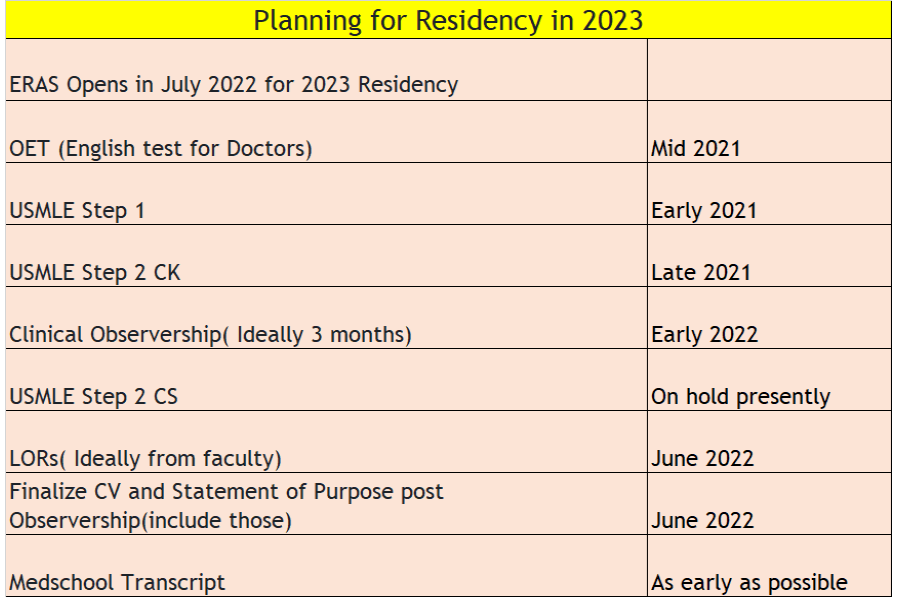Residency info for IMGs
US Medical Residency - Information
The residency admission process for all specialties, whether medical or surgical, is the same across the US with some minor variations by way of local program requirements or preferences. For example, some programs are particular about at least 3 months US Clinical Experience whereas some do not insist on US clinical experience. Most programs participate in a common centralized selection process called ERAS, but a very few may not participate. Almost all programs offer an ACGME accredited residency but again a very few have non-accredited programs.
Listed below are the requirements you need to fulfill to be able to apply for residency program and broadly the action plan

Residency Requirements
- USMLE Step I
- USMLE Step II
- USMLE Step III
- Occupational English Test (OET) Medicine
- CV
- Statement of Purpose
- Letters of Recommendation
- Medical School Performance Evaluation/ Dean’s Letter
- Medical School Transcripts
- US Clinical Experience
- Application Process
- Interview Process
- Expression of Interest
- Matching
<— All items listed here in should be considered of equal weightage, Step I & 2Ck however are first first filters, because this is the first filter the programs use to shortlist the candidates for the interview.
USMLE Step I
Step I exam is one day, about 8 hours in duration, comprising of about 280 MCQs. The test can be taken at any of the available authorized Prometric centers near you. Presently there is a scoring system but from January of 2022 it will be graded only as pass/fail.
Please note a candidate is allowed only 4 attempts including the incomplete attempts starting July 2021. Visit the site for more information.
USMLE Step II
This has 2 components, CK & CS
CK– Clinical knowledge, the format is like Step I, that is MCQ.
CK, is a one day, about 9 hours exam, comprising about 318 MCQs. The test can be taken at any of the available authorized Prometric centers near you.
Please note a candidate is allowed only 4 attempts including the incomplete attempts starting July 2021.
CS– Clinical skills, this is a clinical skills-based exam on standardized patients. Step II CS can be taken only in the US (Atlanta, Chicago, Houston, Los Angeles and Philadelphia).
Due to present COVID-19 pandemic situation Clinical Skills component of step 2 has been suspended till June of 2021. Look for notifications and alternative pathways to CS on ECFMG site.
USMLE Step III
Step III is a 2 day examination lasting about 7 hours on day 1 and 9 hours on day 2. The format is a mix of MCQs and case simulations.
A candidate is not allowed to take Step 3 till he/she passes Step 1 and 2. Since Step 2 CS is not being conducted presently, the Step 3 requirements have changed. Go through the following sites for more information.
Occupational English Test (OET) Medicine
OET is required to for IMGs to prove English proficiency. This is conducted by ECFMG.
CV
CV should be clean and crisp, meaning every achievement you mention in the CV should be backed by documentation (no embellishments!) and only relevant items should be listed.
List recent academic qualifications first and continue down. Then list work experience in the same order. These could include any research and other clinical experiences including Observerships. Mention honors and other academic achievements along these. Also list voluntary work.
List extracurricular activities like excellence in sports or music.
Statement of Purpose
This is about yourself, rather why you should be accepted into the program. Tell why you are interested in the specialty with anecdotes and incidents. Also mention how you think you can contribute to the program and specialty. This is your selling point.
Make sure that both the CV and Statement of purpose are free of grammar and spelling mistakes and the CV is well formatted. There may be questions in your interview based on your CV and Statement of Purpose.
Letters of Recommendation
You will be able to upload on ERAS up to 4 letters of recommendation. This is apart from the mandatory Dean’s letter. Letter from the Chair of the specialty you are interested in should be one of the LOR. Rest three can be from the faculty. Take LORs from the faculty you hope will give you favorable reviews!
Choose a faculty from your choice of specialty. Give sufficient advance time for receiving letters. Write a thank you letter after a letter of recommendation.
Take as many LORs as possible from the US faculty after Observerships and Externships rotations.
US Clinical Experience
Most US programs prefer 3 months of US Clinical experience.
Observerships is not hands on training but is considered as US Clinical experience as it will help you to get to know how the US healthcare system functions as well as getting to know the faculty at the hospital and hopefully generate a LOR from an US faculty.

Medical School Transcripts/ Medical Student Performance Evaluation (MSPE)
This is issued by your medical school. However, the format should be in the US pattern.
MSPE has replaced the term “Dean’s letter” to better describe the purpose of this document, which is to evaluate the performance of the medical student. ERAS Support Services will accept a “Dean’s letter” from your medical school, but we strongly recommend you procure from medical schools an MSPE.
Application Process
You need to apply for Categorical programs if you are looking for mainstream specialty, like Medicine, Pediatrics, General Surgery, Obstetrics& Gynecology etc. However you need to apply for Preliminary year in Medicine or Surgery if you are looking to apply to specialties like Anesthesiology or Neurology.
- Register with USMLE (This you would have already done considering that you took the USMLE Step exams)
- Register with ERAS / AAMC (check links)
- Obtain the 14 digit ERAS token through OASIS (on site) or MyECFMG mobile app
- Upload on to ERAS all the documents (Step scores, CV etc.)
- Register with NRMP (check link)
Interview Process
The program directors after downloading and reviewing the applications will decide to call candidates for interviews. They extend the invitation for an interview and offer a few dates to choose from at the candidate’s convenience. You can use this invitation letter for the purpose of obtaining a Visa.
Post interview they prepare a merit list of candidates of their choice and send it to NRMP to match with the candidate’s preference list.
By now you would have already submitted your preference of programs to NRMP after the interviews.
Matching
The NRMP considers your preference and the program’s preference and makes a match.
The NRMP will inform you by mail about your match status or you can login into your NRMP account to see the match result. Ranking Opens on Feb 1 at 12:00 pm ET and Rank Order Closes on Mar 3rd 9:00pm ET.
SOAP (Supplemental Offer and Acceptance Program)
If you do not match, you need to participate in SOAP.
Match results are declared on the third Monday of March. The time between 11:00 a.m. ET on Monday and ending at 3:00 p.m. ET on Thursday is the SOAP week when the applicants can contact the programs with unfilled positions and look for a match. The list of unmatched programs will be available on ERAS.

